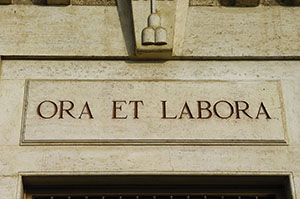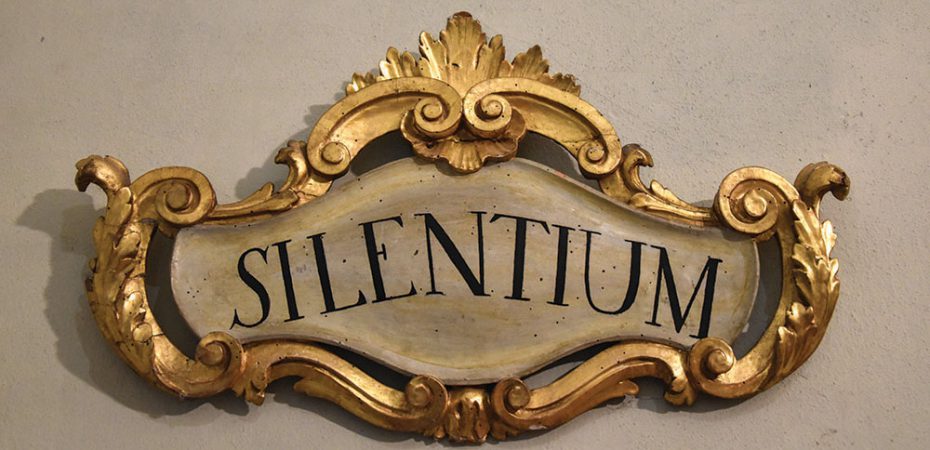The Importance of Intellectual Formation
David A. Lopez Comments Off on The Importance of Intellectual Formation
Most of us are familiar with the twin cornerstones of monastic life, ora et labora — prayer and work. My own spiritual life and formation have always had a strong influence of the Benedictine charism, and these two pillars remain central to my ministry as a deacon.
Prayer, of course, includes not only the commitment to the Liturgy of the Hours and holy Mass, but also many forms of intercessory, devotional and contemplative prayer. And work, likewise, includes not only what I do to provide for my family, which necessarily has a certain vocational priority, but also my parish and diocesan ministry, and all that helps me be better prepared for that ministry. Every vocation and every spiritual charism, I believe, has some version of this same insight.
Regularity, Silence, Contemplation

Moreover, I have continually needed to return to three aspects of that Benedictine charism, to help me flourish in my vocations — regularity, silence and contemplation. Regularity (note, well, the root of the word) is self-discipline by schedule: the cultivation of “radical availability” to love those to whom one’s vocation commits one at every moment. Here we must put aside the obvious, and falsely seductive, secular connotations of “routine,” which idea seeks rather to impose the illusion of control on the various aspects of one’s life and, therefore, ends with an inward turn toward the love of self.
Routine, in this sense, uses the comforting familiarity of noise — whatever distracts us from radical availability to love those to whom our vocation commits us — to drown out the small, still voice of God within. Regularity, by contrast, works by pruning away the noise, by putting what is most important according to our vocation and state in life in the central place in our schedule, throughout the whole day, and committing us to pay attention to this, here and now. It is, if you will, the sanctification of time by non-liturgical means.
………………………………………………………………………………………………………………………………………………………….
RESOURCE
The Josephinum Diaconal Review publishes essays and book reviews addressing a range of topics of interest to those in the Order of Deacons and diaconal ministry. The vision of the institute positions the JDR as a significant resource for the formation of deacons and an essential component in the continuing formation for deacons. Deacon David Lopez, Ph.D., is the editor. For more information, visit deacons.pcj.edu/jdr/
………………………………………………………………………………………………………………………………………………………….
Silence is the art of dying to self. It is learning to love and will what God loves and wills, in place of merely what pleases us. Like Elijah in the cave, who heard God’s voice not in the earthquake or the thunderstorm but in the breeze’s gentle whisper, we need to learn not to heed so much to the insistent, noisy, dramatic pace of life, but rather to cultivate the precious moments of interior stillness. Again, silence contradicts worldly ideals of activity, success and so on, by which we convince ourselves that whatever pleases our will, even within the limits of Christian morality, ought to be pursued. This is the opposite of dying to self. Over time, we can cultivate that interior silence, even in the midst of the storms of life, so that we are always attentive to how God wishes to use us in a given moment.
Contemplation is being nourished by God alone. Usually, we mean this in a spiritual and intellectual sense, as our mind and heart are filled and satisfied with loving God alone, and, therefore, those to whom our vocation commits us. Just to prove the point, however, a small number of saints and mystics — for example, St. Catherine of Siena and St. Joseph of Cupertino — lived for years at a time consuming no physical nourishment apart from the holy Eucharist. The worldly opposite of contemplation is self-contemplation, pride, being “full of oneself.” Obviously, this sort of person makes a poor minister in any vocation, because they do not know and love God well enough to be able to witness to him.
There are many avenues of contemplation, but I recommend two in particular: lectio divina and adoration, the prayerful rumination on the Word of God in, respectively, Scripture and the Most Blessed Sacrament.
Ongoing Intellectual Formation

Under both paradigms — that of ora et labora, and that of regularity, silence and contemplation — the study of the faith is essential. The pursuit of ongoing intellectual formation helps one to grow in both holiness and commitment to loving service. In my experience of forming deacons, this is the hardest of the four pillars in which to instill a commitment to regular growth. The immediate ministerial value of the other three seems more obvious: the spiritual to prayer, so that one feels closer to God; the human to virtue, so that one sins less; the pastoral to ministry directly, so that one serves more competently.
Yet, since faith is always “faith seeking understanding,” our mind needs actively to follow our heart, not remain static in knowledge (or worse!), as we grow closer to God, and learn to love more and more like Christ.
DAVID A. LOPEZ, Ph.D. is the editor of the Josephinum Diaconal Review and serves as the director of deacon formation and as chancellor for Diocese of Sioux City.
……………………………………………………………………………………………………………………………………………………………
Josephinum Diaconal Review and Formation
Among the many available resources for our ongoing intellectual formation as deacons, the Josephinum Diaconal Review stands out to me, for its pertinence, accessibility and quality. Written, like this journal, mostly by deacons and for deacons, but in a theological context suitable for the depth of study and ongoing intellectual formation, the semiannual JDR offers thought-provoking articles about many aspects of the formation, life and the ministry of deacons. We can all benefit from pondering these topics more deeply, from striving more intentionally to “put on the mind of Christ” concerning our diaconal vocation, from taking a break from our insistent routine of “doing” the ministry in order to sit at the feet of our teacher. The JDR exists to help us deacons do just that.
…………………………………………………………………………………………………………………………………………………………….





